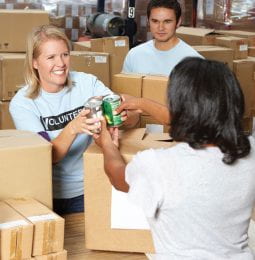 While food pantries have been quite busy this year, the holidays are traditionally the time when there is great need for food pantries. This year is no different.
While food pantries have been quite busy this year, the holidays are traditionally the time when there is great need for food pantries. This year is no different.
Managers of food pantries and food distribution sites can consider these steps to help ensure safe access to food for their clients while helping prevent the spread of COVID-19.
Follow local guidelines and policies as to where and when food distribution can occur. This may include extended hours, outdoor distribution locations, and enhanced COVID-19 safety protocols.
Educate staff, volunteers and clients for their own safety. If anyone is sick, stay home! Clients should find someone else to pick up the food.
Food insecurity, even in the short-term, can have serious impacts on physical and mental health. During this difficult time, food pantry and food distribution sites are critical. Managers can provide safe and flexible options to help people with food insecurity while prioritizing the health and safety of clients, staff, and volunteers.
